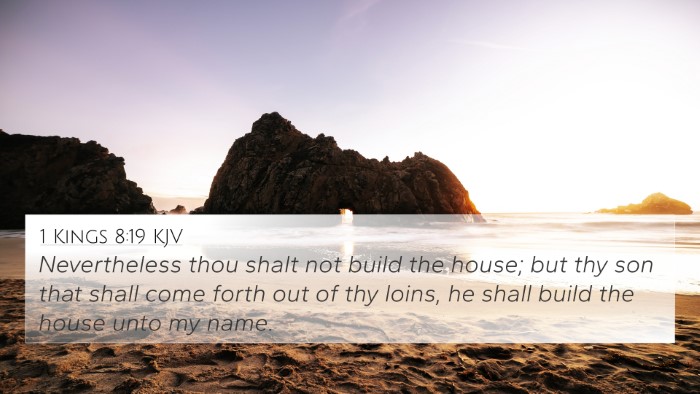1 Chronicles 17:4 Meaning and Interpretation
This verse states:
"Go and tell my servant David, 'Thus says the Lord: You shall not build me a house to dwell in.'" (1 Chronicles 17:4, ESV)
Summary of Meaning:
In this passage, God communicates a significant directive to the prophet Nathan regarding King David's intention to build a temple for the Lord. The essence of this verse encapsulates themes of divine sovereignty and God’s choices in relation to His dwelling place among His people.
Contextual Background
This proclamation is part of a larger narrative where David, having established his reign and secured the kingdom, feels compelled to build a permanent dwelling for the Ark of the Covenant. This reflects his desire to honor God and provide a central place for worship among the Israelites.
Commentary Insights
- Matthew Henry: Henry notes that while David's intentions were noble, it was ultimately not God's will for him to construct the temple. This teaches an important lesson about aligning our plans with divine directive.
- Albert Barnes: Barnes emphasizes that God’s refusal is not indicative of disfavor but rather a reflection of the divine plan. David's son, Solomon, would eventually fulfill this desire, highlighting God's timing and selection.
- Adam Clarke: Clarke elaborates on the significance of the temple, signifying not just a physical structure but a profound relationship between God and His people. Clarke underscores God's desire to dwell in the hearts of His followers over mere ritualistic constructions.
Thematic Connections and Cross-References
This verse connects to various themes throughout Scripture regarding God's dwelling, worship, and His choices in guiding His people. Below are some significant Bible verse cross-references related to this teaching:
- 2 Samuel 7:5-7: God directly addresses David's intentions about building a house for Him.
- 1 Kings 6:1: Chronicles contextually ties the prophecy to the eventual construction of the temple by Solomon.
- Acts 7:48-50: Stephen notes that the Most High does not dwell in temples made by human hands.
- Hebrews 9:11-12: Highlights Christ's role as the ultimate means of access to God, surpassing earthly temples.
- Isaiah 66:1-2: God expresses His view on heaven as His throne and earth as His footstool, emphasizing His preference for humility and contrite spirits over structures.
- Exodus 25:8: God’s original intention to dwell among His people with the Tabernacle concept serves as a parallel in understanding God's dwelling among humanity.
- Romans 8:9-11: The indwelling of the Holy Spirit signifies God’s desire to reside within believers’ hearts rather than physical buildings.
- Revelation 21:3: Envisions a future where God dwells with humanity, culminating the narrative of God’s relationship with His creation.
Lessons and Applications
From 1 Chronicles 17:4, we learn vital lessons applicable to our faith today:
- Divine Sovereignty: Understanding that God has a plan and that our desires must align with His will.
- God’s Presence: Realizing that God desires to dwell not in buildings but in the hearts of believers, highlighting the relational aspect of faith.
- Trust in God’s Timing: Accepting that God’s plans may unfold differently than our expectations but are always for His glory and our good.
Applying Cross-Referencing in Study
Utilizing tools for Bible cross-referencing can deepen understanding and enrich personal Bible study:
- Explore a Bible concordance to identify verses related to God's dwelling.
- Engage in cross-reference Bible studies to uncover thematic links across scriptures.
- Use a Bible cross-reference guide to follow connections between the Old and New Testaments.
Conclusion
In summary, 1 Chronicles 17:4 not only illustrates God's response to David's noble intentions but also reveals critical themes about divine choice, God's desire for a relationship with His people, and the ultimate purpose of worship. This engagement with Biblical texts through cross-referencing facilitates a richer understanding and deeper appreciation for the Scriptures as they interweave God’s story with that of humanity.









